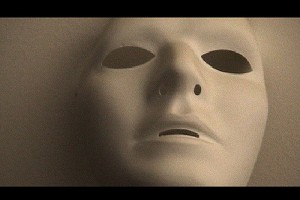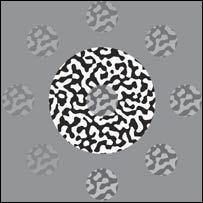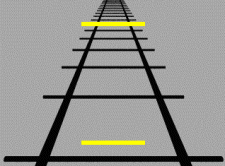Optical Illusions That Predict Schizophrenia
You might already know that possible symptoms of schizophrenia can include delusions and hallucinations. But did you know that in some situations people with schizophrenia actually have a better grasp on reality that those without the disorder?
Specifically, people with schizophrenia seem not to be susceptible to some kinds of optical illusions. Researchers have long known that schizophrenia is associated with fundamental changes in perception, and there’s now mounting evidence that these changes can be detected in something as trivial as how people see optical illusions.
Here are 4 illusions that people with and without schizophrenia tend to perceive differently:
1. Hollow Mask Illusion
When presented with a concave mask, people tend to see it as convex rather than concave – that is, they see it as a normal mask rather than the hollow mask it really is. The idea of a concave face doesn’t make a lot of sense, so people’s brains will generally choose to reinterpret a hollow mask as a more familiar convex face.
See this video for an animation of what the hollow mask illusion lo oks like.
oks like.
People with schizophrenia, however, aren’t fooled by this illusion. If you show them a hollow mask, they tend to see it for what it is – a hollow mask.
A 2009 study came up with dramatic results on just differently people with and without schizophrenia perceive this illusion. The 16 participants without schizophrenia mistook 99 percent of the hollow faces they saw as convex faces, but the 13 schizophrenia patients perceived the hollow faces as convex only 6 percent of the time.
The study also suggested a possible explanation: it may be that people with schizophrenia experience differences in brain connectivity that lead them to process things in a more “bottom-up” way – whereas people without schizophrenia process things in a more “top-down” way, which leads them to conclude based on previous experience that seeing a hollow face is unlikely.
2. Chubb Illusion
Chubb illusions take advantage of how we perceive contrast – in particular, the fact that we tend to see something as lower-contrast if it’s placed on a high-contrast background. For example, take a look at the following picture:
Which of the small circles around the edge of the larger circle matches the small circle within the larger circle? On average, people will say that the small circle at 10:30 o’clock bears the closest resemblance to the small central circle.
However, a 2005 study found that people with schizophrenia estimate the circle at 6:00 o’clock as being most similar to the central circle. And in fact, the people with schizophrenia are correct – the high-contrast circle at the bottom is the same as the inner circle.
As with the hollow mask illusion, one possible explanation is that people with schizophrenia make less use of context and process things in a more bottom-up manner, which in this case leads them to see the image as it really is.
3. Müller-Lyer and Ponzo Illusions
Although people with schizophrenia aren’t tricked by some illusions, they’re also more susceptible to others.
A 2011 study showed that they’re worse at guessing the lengths of the lines in the Müller-Lyer illusion (the lines are the same length):
Whether people with schizophrenia are fooled by an optical illusion can also depend on how long they’ve had the disorder. Paradoxically, the same study that looked at the Müller-Lyer illusion also discovered that people who haven’t had schizophrenia for very long are less susceptible to the Ponzo illusion than people without schizophrenia, but people who’ve had schizophrenia for a while are more susceptible than people without schizophrenia (again, the lines are the same length):
4. Three-Flash Illusions
Some optical illusions take place not just in space, but in time as well. In the three-flash illusion, people will often perceive two flashes of light displayed in quick succession as three distinct flashes.
As for how schizophrenia fits into the picture, well, a 2008 study found that in this case the devil’s in the details.
When the flashes of light are between 90 and 110 ms apart, people with schizophrenia are less susceptible to the illusion – that is, they’re more likely to correctly perceive the two flashes of light as two flashes of light than people without schizophrenia.
When the flashes are between 130 and 310 ms apart, though, people with schizophrenia are more likely to mistakenly perceive three flashes. To put it another way, both people with and without schizophrenia are susceptible to this illusion, but for people with schizophrenia it takes place on a larger time scale.
Exactly why things work out this way is anyone’s guess for now, but the researchers suggested that certain aspects of time perception may be more “dilated” for people with schizophrenia.
Screening for Schizophrenia With Optical Illusions
So does all this mean a diagnostic test for schizophrenia based on optical illusions is in the cards? Well, not yet – none of these illusions discriminate perfectly between people with and without schizophrenia.
But some of the results are dramatic, and it’s possible that this line of research could lead to improved screening procedures or at least a better understanding of how schizophrenia has to do with changes in the way people see the world.
Time will tell, but one thing we do know for now is that optical illusions, which we often think of as little more than parlor tricks, could hold some of the secrets to how our brains work, how we see the world and what happens when our thoughts and perceptions go awry.
Title image: Freeimages.com/ruchi rao
Hollow mask image: Flickr.com/Atom
Chubb image: Dakin et al.
Müller-Lyer image: Wikipedia.org/Fibonacci



Apparently I have schizophrenia. What do I do now?
Not to worry! They don’t discriminate perfectly between people with/without schizophrenia. People who are high or drunk are also less susceptible to the hollow mask illusion, to give one example.
My Wife and I are both on the Autism Spectrum (her mild myself moderate) and we see through the Hollow mask illusion- Maybe you’re just on the Autism Spectrum?
What kind of clock are they using in the CHUBB test because I have no clue how to tell where 10:30 even is! Anyone else confused by that one??
Hi Tonya! I probably should’ve just said the northwest circle. Or, starting from the palest/lowest-contrast circle and moving around toward the highest-contrast, people typically see it as the third circle when it’s actually the eighth circle.
like the place where 10:30 on a clock would be. Upper left between 9am and 12noon.
Top left and 6 o’clock is 10.30
This was a nice article
people will often perceive
two flashes of light
displayed in quick succession
as three distinct flashes.
Illusion show
Thank you for this
Information.
Thanks!
“10:30 o’clock”
Nice.
Aparently I’m schizophrenic. I’m not drunk or smoking weed or drugs
Well, I wouldn’t worry too much… Which illusions didn’t work on you?
I see the mask as hollow, for the Chubb illusion I said around 4:30, and the top yellow line of the railroad track illusion looks much larger to me.
Are there any other predictors of Schziophrenia?
I have had a few instances of hearing voices and sounds that aren’t there, but these instances are quite rare.
I don’t remember the exact numbers, but I read that a surprisingly high portion of the “normal” population has occasionally experienced auditory hallucinations, so I wouldn’t worry too much about that. (Actually, if I can find that research again, I might write a post on here about it some time.)
I’m not a doctor, but as far as I know the main things to look for would be significant symptoms (delusions, hallucinations, etc.) that affect your life, and maybe a family history of psychosis. Keep in mind that if you have to ask what symptoms to look or, you’re probably not experiencing them! But you might be interested in looking up “schizotypy,” which is the idea that people in the general population can have mild, schizophrenia-like traits.
Fascinating, I now fall for the illusion.
It’s all over for me. I wish Agnews “Development Center” was still viable. I would be at their Rapaport reception building now. But for the rest, I think that being high on pot causes results of a schitzo on these tests say something about using this stuff. On my way!
what if you get them all right ? So i’m not talking about myself, just am wondering and wanting to know more. what if one sees the true nature of the illusion in all of them, and whatever else is out there, i’m referring to moving and non moving pictures and objects, but at the same time is able to see the other way around as well if he or she tries ? And out of the various and many illusion out there, does have a problem with literally a couple, where he/she is not able to see it at all like everyone else does, even after significant focus and tries, but these are just literally two out of like a 100. Basically will first see the true nature and then is able to switch it as well, with the exception of just two out of a 100.
ive been diagnosed with Schizophrenia will it get worse is it safe to be around others ?what type of at home therapy activities can i do due to the recent quarantine from the corona virus?should i take medication to deal with it ? what advice can you give me ?where do i turn to? am i alone? i have so many questions………..